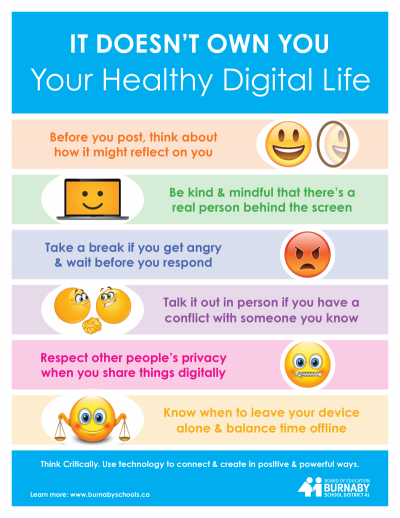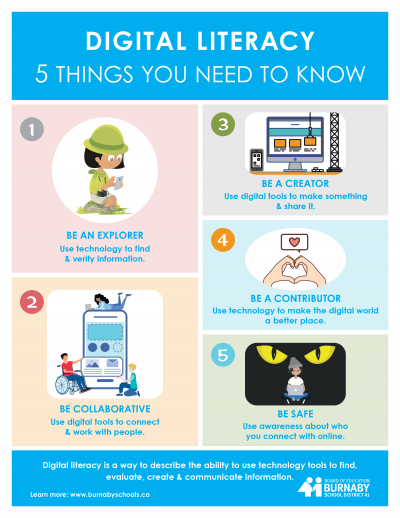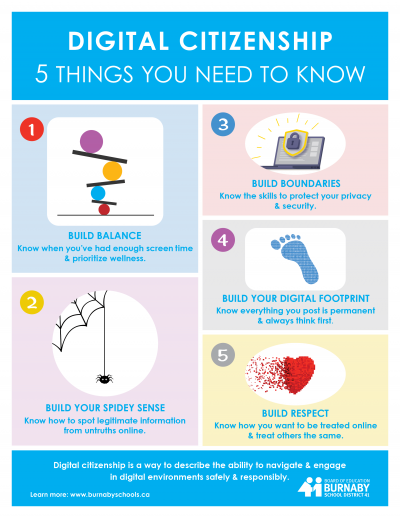While today’s students have grown up with technology, the knowledge and skills to navigate it safely and in a useful way don’t necessarily come naturally. A new awareness campaign, combined with learning skills in classrooms, is designed to support students to best use technology.
The focus is on familiarizing students with what’s called digital literacy and digital citizenship, as well as supporting a healthy digital life. Digital literacy describes the ability to use technology tools to find, evaluate, create, and communicate information. Digital citizenship is the ability to navigate and engage in digital environments safely and responsibly.
Lucky Saini is the District Principal of Education Technology for the Burnaby School District:
 Digital literacy and citizenship skills are the building blocks to make smart and safe use of technology in all aspects of life. Whether it’s about cell phone use, artificial intelligence, or safe and respectful use of social media, technology comes at children and youth quickly. Having a foundation in digital literacy and citizenship gives them the tools to both make technology work for them and make good decisions while they’re using it.”
Digital literacy and citizenship skills are the building blocks to make smart and safe use of technology in all aspects of life. Whether it’s about cell phone use, artificial intelligence, or safe and respectful use of social media, technology comes at children and youth quickly. Having a foundation in digital literacy and citizenship gives them the tools to both make technology work for them and make good decisions while they’re using it.”
Students as young as Kindergarten and through Grade 12 will learn through age-appropriate lessons and activities. The learning outcomes are wide-ranging, such as: demonstrating skills to create and share work digitally; finding and verifying information; staying safe online and being mindful of your digital footprint; being respectful to others in digital spaces; and healthy use of technology.
Burnaby Mountain Secondary student Lucas Fong is part of the District Student Advisory Council (DSAC). The Grade 12 thinks it’s important for this kind of learning in schools:
“Living in a society of technology that advances at unprecedented speeds, it is important that our youth learn how to navigate through social media platforms responsibly. Providing a space where students can learn about the effects of social media and how to moderate usage would be beneficial towards preventing cyberbullying cases and reduce the number of victims of social media traps.”
Fellow DSAC member Benny Woods is a Grade 12 student at École Cariboo Hill Secondary, and also sees a need for this campaign and classroom learning:
“I see a great need for digital skills within schools. It seems to me that every student now has social media accounts, even those in elementary school. Students are not well informed about the negative impact that may result from these types of accounts. Children do not know how to navigate online relationships or hold themselves responsible for what they say or do online.”
In the classroom, teachers are being supported with resources and lesson plans. Professional development is structured around four themes: digital identity and relationships; privacy and security; mental health and wellness; and media literacy.
The campaign includes a series of posters about digital wellness, literacy, and citizenship at schools, as well as regular content for parents. The information for families is posted on a new webpage and is designed to provide practical supports for those who are looking for them. It includes tools, such as how to make a media usage plan to balance screen time, and information that demystifies social media platforms used by youth.
The District is planning information evenings in the spring for parents and families who are looking for support, as they help their children navigate their digital lives outside of school. Details about when, where and how to register can be found here.
Learn More
Visit the New Web Page with Supports for Families With Their Strategies at Home
Read the Story in the Burnaby Now
Printable Posters
It Doesn’t Own You: Your Healthy Digital Life
Digital Literacy: Five Things You Need to Know
Digital Citizenship: Five Things You Need to Know
See All 3 Pieces in Your Healthy Digital Life Poster Series
Posted February and Updated March 14, 2024



